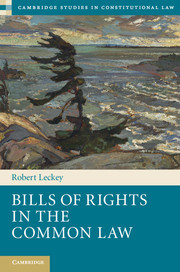Description
Bills of Rights in the Common Law
Cambridge Studies in Constitutional Law Series
Author: Leckey Robert
This book argues that judges sacrifice individual rights by using less than their full powers in order to appear democratically legitimate.
Language: English
Subject for Bills of Rights in the Common Law:
Approximative price 93.25 €
In Print (Delivery period: 14 days).
Add to cart
Bills of Rights in the Common Law
Publication date: 05-2015
258 p. · 15.2x22.9 cm · Hardback
Publication date: 05-2015
258 p. · 15.2x22.9 cm · Hardback
Approximative price 38.92 €
In Print (Delivery period: 14 days).
Add to cart
Bills of Rights in the Common Law
Publication date: 05-2015
256 p. · 15.2x22.9 cm · Paperback
Publication date: 05-2015
256 p. · 15.2x22.9 cm · Paperback
Description
/li>Contents
/li>Biography
/li>
Scholars have addressed at length the 'what' of judicial review under a bill of rights - scrutinizing legislation and striking it down - but neglected the 'how'. Adopting an internal legal perspective, Robert Leckey addresses that gap by reporting on the processes and activities of judges of the highest courts of Canada, South Africa and the United Kingdom as they apply their relatively new bills of rights. Rejecting the tendency to view rights adjudication as novel and unique, he connects it to the tradition of judging and judicial review in the Commonwealth and identifies respects in which judges' activities in rights cases genuinely are novel - and problematic. Highlighting inventiveness in rights adjudication, including creative remedies and guidance to legislative drafters, he challenges classifications of review as strong or weak. Disputing claims that it is modest and dialogic, he also argues that remedial discretion denies justice to individuals and undermines constitutional supremacy.
Introduction; 1. Against Bill of Rights exceptionalism; 2. The common law, judging, and three Bills of Rights; 3. Judicial review of legislation before Bills of Rights; 4. Bills of Rights and other means of accessing judgment; 5. Putting the strike-down in its place; 6. Remedies from text to practice; 7. Improving the system and engaging the legislature; 8. Rethinking remedies and constitutional supremacy; Conclusion.
Robert Leckey is an associate professor and William Dawson Scholar in the Faculty of Law and director of the Paul-André Crépeau Centre for Private and Comparative Law at McGill University, where he researches in comparative law, constitutional law and family law.
© 2024 LAVOISIER S.A.S.




